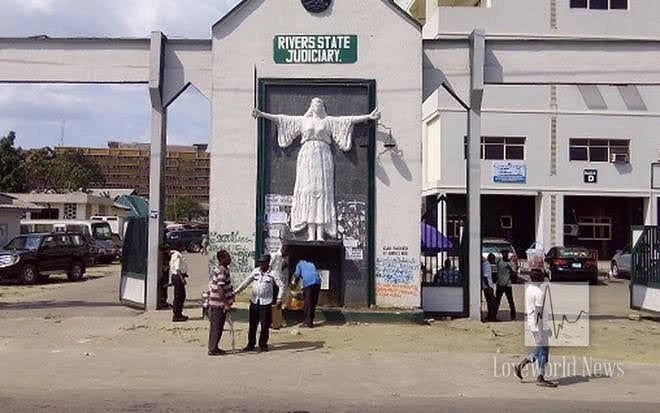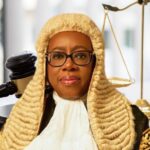The spate of conflicting orders by courts of coordinate jurisdiction has again attracted public criticism in the country, after the Chief Justice of Nigeria (CJN), Justice Tanko Muhammad, summoned chief judges of six states where the latest conflicting orders emanated from.
The latest conflicting orders emanated from Rivers, Kebbi, Cross River, Anambra, Jigawa and Imo states, where injunctions on political matters were made by various courts in the past few weeks.
- Intrigues as PDP bigwigs battle for 2023 presidential ticket
Despite huge pay, senators, reps, fleece aides
This is not the first time conflicting orders would be witnessed in the Nigerian judiciary, especially in political cases, neither will it be the first time a serving CJN or heads of lower courts would warn against issuance of such orders.
Such orders, pro-democracy campaigners and watchers of the judiciary say, raise critical issues in the judicial system of Nigeria and make mockery of the judiciary.
The most recent pronouncements in different courts in Rivers and Kebbi states were on the disputed national chairmanship of the Peoples Democratic Party (PDP), under Prince Uche Secondus.
On August 24, Justice Okogbule Gbasam of the Rivers State High Court in Degema, in an ex-parte application by some aggrieved members of the PDP, restrained Secondus from parading himself as the party’s national chairman pending the determination of the main suit.
But the order was on August 26 invalidated by a Kebbi State High Court in Birnin Kebbi, which issued an order of interim injunction reinstating the embattled chairman pending the determination of the suit numbered KB/HC/M.171/2021.
Justice Nusirate Umar ruled, “An order of this honourable court granting leave to the first respondent (Secondus) to continue exercising all the constitutional powers of the office of the chairman of the PDP (second defendant) as enshrined in both the 1999 constitution of Nigeria as amended and the Peoples Democratic Party’s constitution pending the hearing and final determination of the applicant’s motion on notice.”
The suit was filed by three “concerned members” of the party, Yahaya Usman, Abubakar Mohammed and Bashar Suleiman, through their counsel, Ibrahim Jibrul.
Another Cross River State High Court presided by Justice Edem Kooffreh granted an interim order restraining Secondus from resuming office as chairman.
Typically of such controversial judgments, they increase during election cycles, with Anambra State governorship elections enjoying a fair share of them.
For instance, during the 2014 governorship elections, various courts gave conflicting orders on the dispute between the Ken Emeakayi-led PDP executive and the Ejike Oguebego-led faction of the party.
The order of Justice Hyeladzira Nganjiwa had on August 28, 2013 directed the Independent National Electoral Commission (INEC) to identify candidates produced by the Oguebego faction of the party, thus recognising the Andy Ubah candidacy against the Tony Nwoye faction.
The two factions continued to slug it out in court as a fresh application in number: FHC/ABJ/CS/680/2014 – Ken Emeakayi versus Peoples Democratic Party and 6 others – was taken before Justice Evo Chukwu of the Federal High Court in Abuja in 2014.
The contentions were resolved by the Supreme Court’s judgement of January 28, 2016 in a lead judgement read by Justice John Inyang Okoro thus: “There is a pending, subsisting, binding and enforceable order of interlocutory injunction made by Justice H. A. Ngajiwa of the Federal High Court in suit number FHC/AWK/CS/247/2013, now Ejike Oguebego versus the Peoples Democratic Party and 3 others on September 12, 2013, to the effect that the Peoples Democratic Party and the Independent National Electoral Commission should recognise and deal only with the Ejike Oguebego-led state executive committee of the Peoples Democratic Party, Anambra State chapter in all election matters.”
The fresh ‘war’ over Anambra
The Anambra State governorship election fixed for November 6, 2021, again attracted a high number of litigations and conflicting orders among the three major political parties in the state – the PDP, All Progressives Congress (APC) and the All Progressives Grand Alliance (APGA).
A Federal High Court in Awka had on July 2 refused an application by a factional national chairman of the APGA, Edozie Njoku, to stop the primary, which produced Professor Chukwuma Soludo and allow the faction to conduct a fresh election. The order meant that Soludo retained his candidacy of the party.
But an Upper Area Court in Abuja, on July 15, summoned Soludo following an application seeking to disqualify him on account of alleged perjury and breach of code of conduct while in office between May 29, 2004 and May 29, 2009.
This was followed by an order of an Imo State High Court in Owerri on August 19, refusing an application by Victor Oye, whose faction produced Soludo as APGA candidate, to void an earlier order recognising the Jude Okeke-led convention, which produced Chukwuma Umeoji as the candidate of the party.
Soludo was eventually reinstated as the APGA candidate after a Court of Appeal in Enugu dismissed the appeal against him by the Okeke and Umeoji faction.
In the PDP, different court orders recognised Ugochuwku Uba and Valentine Ozigbo as candidates of the party in the election.
A Federal High Court in Abuja had on July 15 restrained the INEC from recognising Ozigbo as the real candidate of the PDP.
A similar order was made on July 19 by an Anambra High Court in Awka declaring Uba as the real candidate of the party on the ground that the congress that produced him was the proper one.
But on July 20, a Federal High Court in Awka ordered the INEC to publish the name of Ozigbo as the candidate of the PDP, maintaining that the primary held on June 26, 2021 at the Professor Dora Akunyili Women Development Centre, Awka, in which he polled majority votes, was the proper exercise.
However, the Court of Appeal in Abuja, on September 3, upheld Ozigbo’s candidacy and ordered the INEC to publish same. This was similar to the appellate court’s judgement on July 30, recognising the executive committee of the PDP in the state led by Ndubuisi Nwobu, which conducted the primary that produced Ozigbo.
Makarfi vs Sheriff saga
The dispute over the national chairmanship of the party between former governors of Kaduna and Borno states, Ahmed Makarfi and Ali Modu Sheriff in 2016 attracted conflicting court orders.
The Modu Sherriff faction had on May 12, 2016 obtained an ex-parte order of a Lagos High Court, halting any move to dissolve his National Working Committee (NWC) at its planned national convention. The order was reiterated by Justice Ahmed Mohammed of a Federal High Court in Abuja on May 18 and May 20, 2016 and Justice Ibrahim Buba of another Federal High Court in Lagos.
After the party proceeded with the national convention, a Federal High Court in Port Harcourt, presided by Justice A. M. Liman, on May 24, 2016, issued an order restraining Sheriff and Prof Adelawe Oladapo from parading themselves as national chairman and secretary respectively.
Two contradictory orders were made by a Federal High Court in Abuja and an FCT High Court on June 29, 2016 after Justice Okon Abang, in a suit by a governorship aspirant in Ondo State, Chief Benson Akingboye and his counterpart in Edo State, Ehiozuwa Agbonayinma, ordered the INEC to only accept candidates from the Sheriff-led executive. But Justice Valentine Ashi of an FCT High Court removed Sheriff on the ground that the process that produced him was illegal.
On June 30, 2016, Justice Hussein Baba Yusuf of the FCT High Court dismissed Sheriff’s suit challenging the actions of the caretaker committee of the PDP for not having the consent of the party’s NWC.
The dispute was resolved when the Supreme Court in July, 2017 nullified Sherriff’s claim to the chairmanship of the PDP.

The orders on Oshiomhole
Also, the battle over the control of the APC in Edo State attracted conflicting orders of courts. First, Justice Danlami Senchi of the FCT High Court, on March 4, 2020, suspended the former national chairman of the party after an application that he was already suspended at the ward level. However, on March 5, 2020, a Federal High Court in Kano, presided by Justice Lewis Alagoa, reinstated Oshiomhole and ordered the party to maintain status quo in the matter.
However, in June 2020 and March 2021, both the Court of Appeal and the Supreme Court upheld Oshiomhole’s earlier suspension by the court, thereby putting an end to the dispute.
CJN, NBA frown at malpractice
The CJN, in his reaction to the latest spate of conflicting orders, said the invitation was “even more compelling, having regard to earlier warning by the National Judicial Council (NJC) to judicial officers on the need to be circumspect in granting ex-parte applications.”
Also, the Nigerian Bar Association (NBA), in a statement signed by its president, Olumide Akpata, blamed senior members of the profession for the persistent problem of conflicting orders and warned of sanctions.
The statement reads, “Astonishingly, that commitment is being threatened by the conduct of some of our members, the majority of who are senior members of the Bar, who continue to yield themselves to be used as willing tools by politicians to wantonly abuse the judicial process.”
Judiciary should be wary of politicians – APC chieftain
Meanwhile, a chieftain of the All Progressives Congress (APC) and former Minority Leader, House of Representatives, Farouk Adamu Aliyu, has advised the Nigerian judiciary to be wary of politicians who rush to obtain court orders in order to stop political processes.
He gave the advice in an interview with Daily Trust on Friday.
Aliyu spoke on the recent court order restraining members of the Mai Mala Buni-led Caretaker Committee from parading themselves as leaders of the party.
“If a politician deliberately, may be 24 hours to a Congress or Convention come and look for an order, they should look at the consequence of that order.
“What can that order bring? Laws are supposed to be obeyed. There are certain orders you will give which should not be obeyed. So, which means judiciary if they did not stand up, they will plunge this country into crisis. I call on them, as I said, I call on them to be very careful,” he said.
By John Chuks Azu, Haruna Ibrahim & By Balarabe Alkassim

 Join Daily Trust WhatsApp Community For Quick Access To News and Happenings Around You.
Join Daily Trust WhatsApp Community For Quick Access To News and Happenings Around You.


